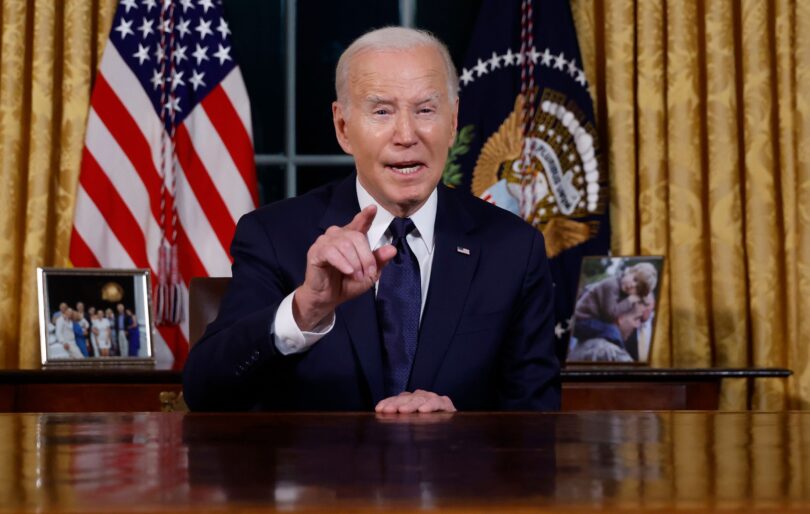David A. Andelman
Critics claim that President Joe Biden has failed in his efforts to project American power effectively for the American people and their allies around the world. But I am confident he will go down in history, as he should, for being one of the rare presidents who has accomplished something quite extraordinary: He has carefully defined and quite successfully defended democracy and democratic values before a host of existential challenges.
Former Presidents Donald Trump, Barack Obama and George W. Bush wound up ping-ponging from crisis to crisis with no clear sense of what shape the horizon might take, frequently updating their worldviews to match the moment. Bush was against nation-building until he was for it in Afghanistan and Iraq; Obama was against foreign intervention until he was for it in Libya; Trump was for sweet-talking global adversaries until he was against it. Biden, in contrast, has been operating on the basis of a real weltanschauung (or worldview). Former Secretary of State Henry Kissinger told me and other students in his class at Harvard that few leaders, especially presidents of the United States, operated on the world stage with a clear-eyed sense of where they want the world to be at the end of their four or eight years and then worked to get there.
And indeed, few have defined and embraced democracy as a doctrine, viewed crises and partners through such a prism and worked so effectively to further these essential values more than Biden, who spent decades on the Senate Foreign Relations Committee and eight years as vice president before becoming the leader of the Free World. Biden’s latest challenge, of course, is in Israel and Gaza. In the face of a barbaric terrorist attack by Hamas on Israel and the unrelenting response of the government under Israeli Prime Minister Benjamin Netanyahu, Biden has stood squarely by Israel, defined by The Economist’s Democracy Index as the only democracy in the Middle East and North Africa.
In contrast to George W. Bush, Biden has modeled how diplomacy as well as force can support efforts to shore up democracy. The US reportedly played a crucial role in getting many Israeli hostages released from Hamas. But the US also quickly dispatched two aircraft carrier strike groups and 900 additional troops to the Middle East to back up his warning to Iran and Hezbollah not to broaden the conflict. Those moves not only safeguard Israel but help secure American interests in the region and show that a democratic power can constrain fundamentalist ones.
Biden is similar to other presidents in getting little credit for what doesn’t happen. Beyond containing the Israel-Hamas conflict (so far), he also hasn’t been properly recognized for avoiding a direct US-Russia confrontation – and likely conflagration – by tempering the delivery of advanced weapons to Ukraine and restraining its efforts to join NATO, even as the US has slowly but steadily ratcheted up the levels of military support for Ukraine. Ukraine, of course, is trying desperately to retain its democratic orientation in the face of Moscow’s violent and autocratic challenge. Though now facing obstacles in Congress, there’s no question that the Biden administration’s support has been essential to Ukraine’s impressive – and, to many, unexpected -success in its continued fight against Russian President Vladimir Putin’s aggression.
Then there’s Taiwan. Chinese President Xi Jinping has redoubled efforts to build pressure to force the island nation’s absorption into mainland China, sending warships and warplanes ever closer to Taiwan – even into and through its airspace. But a still-independent government in Taipei is planning a democratic presidential election on January 13, a robust three-way race in which voters consider an outcome that could well define the island’s future. This is happening with determined American political, diplomatic and military support, including Biden being clearer than previous presidents that the US will defend Taiwan. Despite GOP foot-dragging in Congress, Biden has included funding for Taiwan as well as Ukraine and Israel in a new aid package – an all-but-unprecedented effort at American assistance for democracies under threat.
But while he’s minced no words in continuing to call Xi “a dictator,” Biden has managed the relationship with Beijing rather than rupturing it in ways that could be dangerous. Just this fall, he succeeded in reopening military-to-military channels of communication with China for the first time since Beijing severed them after then-House Speaker Nancy Pelosi’s visit to Taiwan in August 2022. Those who see Biden’s abrupt and chaotic withdrawal from Afghanistan as a failure that damages his record on democracy have themselves failed to recognize a reality that Biden had earlier come to appreciate.
In Afghanistan, democracy never really took root at all. Its ill-conceived and improbable “elections” were little more than window dressing on a deeply flawed and corrupt kleptocracy that America had been backing with the bodies of thousands of its troops. As Sarah Chayes, once a special assistant in the Pentagon, wrote in Foreign Affairs, “Joe Biden was outspoken about his opposition to the intervention.” That underscores the point that Biden’s success isn’t just his principled view of democracies (George W. Bush also prominently called for democratization) but shrewdness in knowing when and where to promote them most effectively.
One could ask what happens when Biden finds himself facing a leader with anti-democratic tendencies like India’s Prime Minister Narendra Modi, who presides over what close observers have called “an electoral autocracy” in what was long a model democratic nation. There, it would appear, Biden has shown steadiness in waiting for the forces that propelled other truly democratic leaders of India’s past to harness the will of the people to return them to power. It has been and will require a most delicate balance that I am persuaded Biden has been adept in implementing. Biden’s determination to defend democracy wherever it manages to gain a foothold and help it to survive, then prosper, is something that makes him tick and remain appealing to others, as I’ve seen in so many parts of the world. Political leaders and other officials from Paris to Riga that I’ve come in contact with during the Biden years have suggested repeatedly how imperative it is that America retain the values Biden holds so close.
“Democracies are more than a form of government,” Biden told the world on November 2, 2022, in a speech the White House titled “Remarks by President Biden on Standing up for Democracy.” “They’re a way of being, a way of seeing the world – a way that defines who we are, what we believe, why we do what we do,” he explained. “We must, in this moment, dig deep within ourselves and recognize that we can’t take democracy for granted any longer.”
CNN







